
ãpi tchu iu
UNIT 1
Dá pra ser saudável sem ser chato
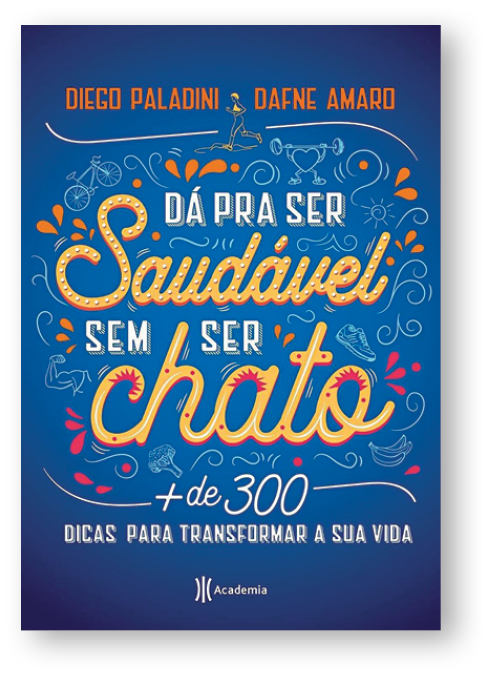
Authors: Diego Paladini and Dafne Amaro. Publisher: Academia. Brazil, 2018.
In this book, P.E. teacher Diego Paladini and yoga teacher Dafne Amaro suggest some simple and easy lifestyle changes that can help improve physical and emotional health. They present tips regarding physical activities, recipes, healthy food etc. and explain how to increase quality of life on a daily basis. This light and easy read paves the way to a pleasurable and accessible healthy lifestyle.
UNIT 2
Earth Song
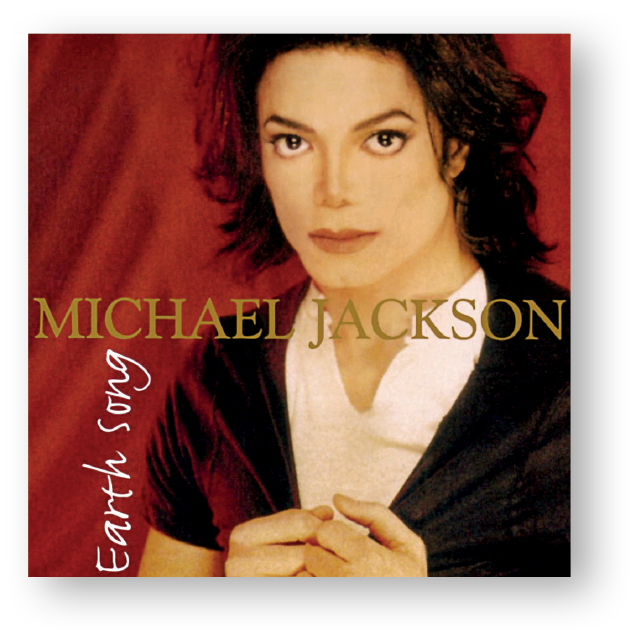
Michael Jackson. Epic Records. United States, 1995.
“Earth Song”, written and interpreted by Michael Jackson, received a Grammy nomination for Best Music Video, Short Form in 1997 due to its social message. The lyrics are a wake-up call to the dire situations caused by humankind and the first to overtly deal with the environment and animal welfare.
UNIT 3
Conecte-se ao que importa: um manual para a vida digital saudável
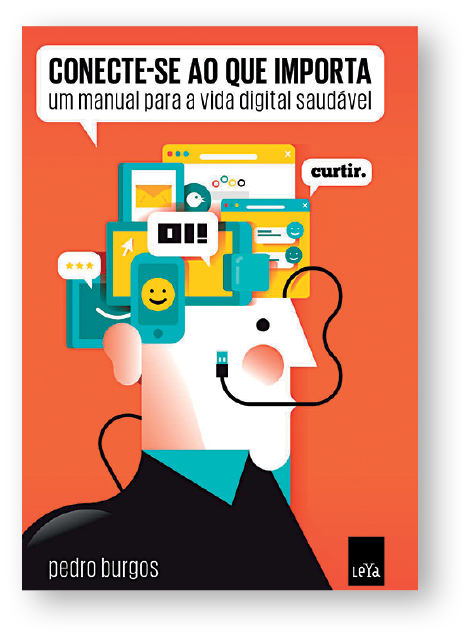
Author: Pedro Burgos. Publisher: Leya. Brazil, 2014.
In this book, the author does not criticize apps or technology, but how people have been misusing them. With this in mind, he suggests improvements on how to use technology selectively and healthily.
UNIT 4
Beyond the Blackboard
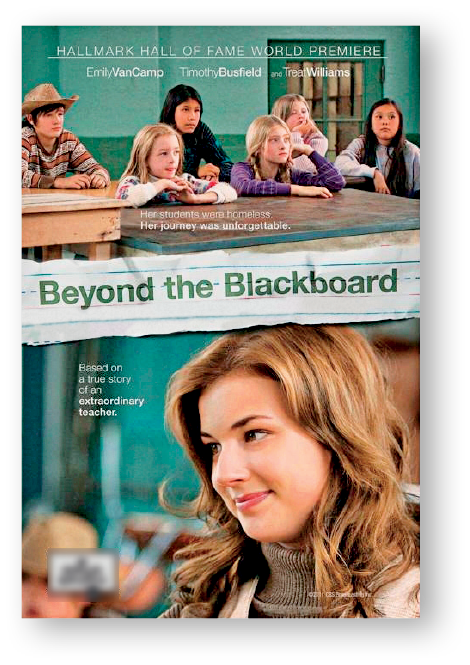
Hallmark Hall of Fame Productions. United States, 2011.
Based on Stacey Bess’ memoir Nobody Don’t Love Nobody, the movie tells the story of a 24-year-old first-time teacher who accepts a position in a homeless shelter for children, overcoming her fears and prejudices and doing her best to make a difference in the lives of these children.
UNIT 5
Museu de Ciência e Técnica da Escola de Minas
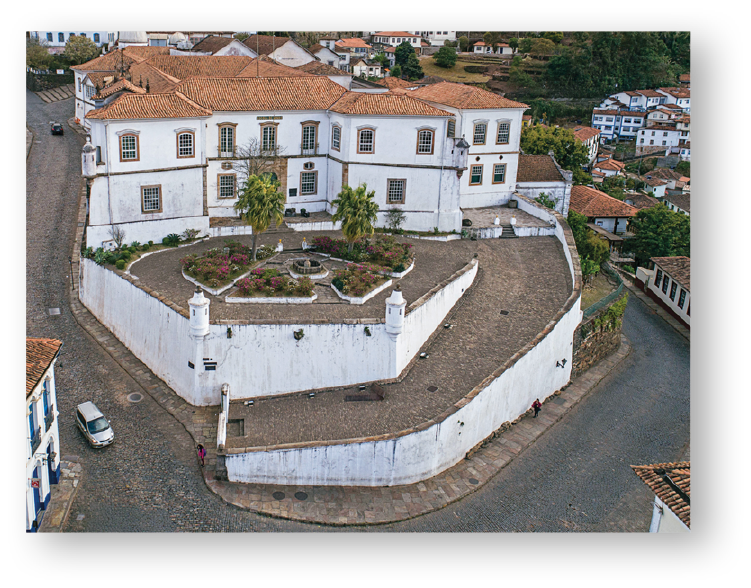
The Museu de Ciência e Técnica da Escola de Minas was created in 1877 by Claude-Henri Gorceix, founder of Escola de Minas. This museum has nine different sections with more than 30,000 pieces from all over the world. This museum has a vast geology collection, which is on display and organized into themes related to several fields of scientific and technological knowledge, such as mineralogy, mining, metallurgy, physics, chemistry, topography and technical drawing.
UNIT 6
Modern Times
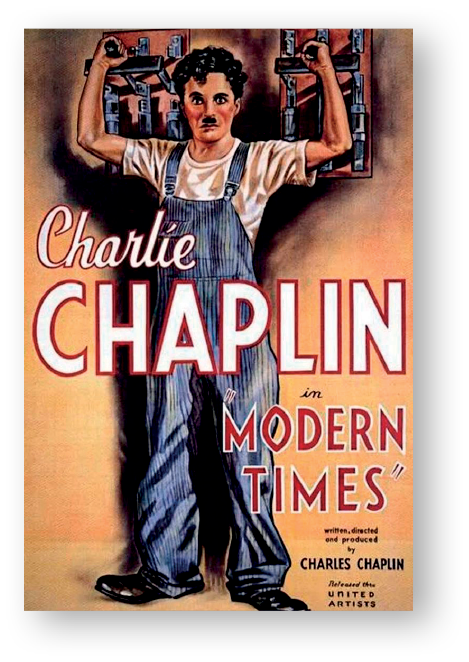
Director: Charles Chaplin. Production company: Charlie Chaplin Productions. United States, 1936.
This comedy masterpiece shows the iconic Little Tramp (Charlie Chaplin) employed as a factory worker in an assembly line, tightening bolts. While portraying many of his adventures and struggles to survive in the industrialized world, the movie comments on modern capitalist society and on the fragmentation and alienation of work caused by the Industrial Revolution.
UNIT 7
Museu do Índio – Funai
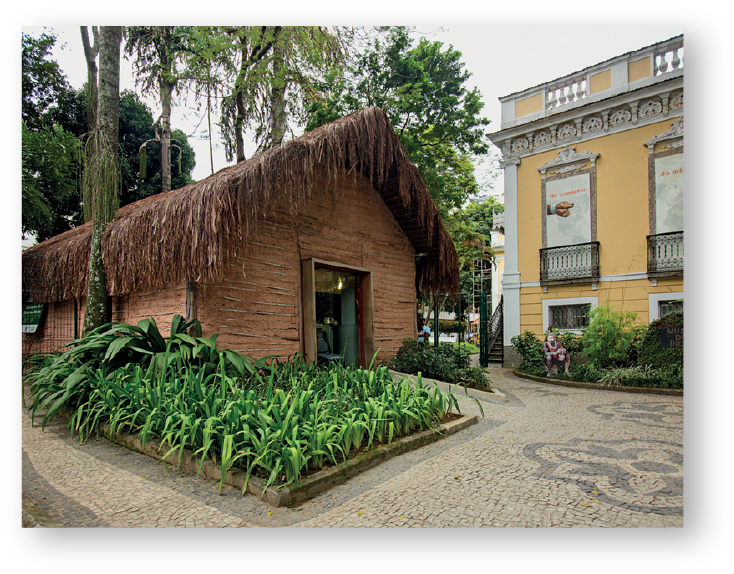
Available at: https://oeds.link/HlKSUv. Accessed on: July 31, 2022.
The Museu do Índio, under the administration of Funai (National Indian Foundation), is an institution dedicated to the preservation and promotion of original peoples’ cultural heritage that strives to disseminate the existence, history and diversity of hundreds of original communities from Brazil. The website of the museum offers a virtual tour, where it is possible to visit part of the collection and learn more about some of these communities’ history and characteristics.
UNIT 8
The Great Debaters
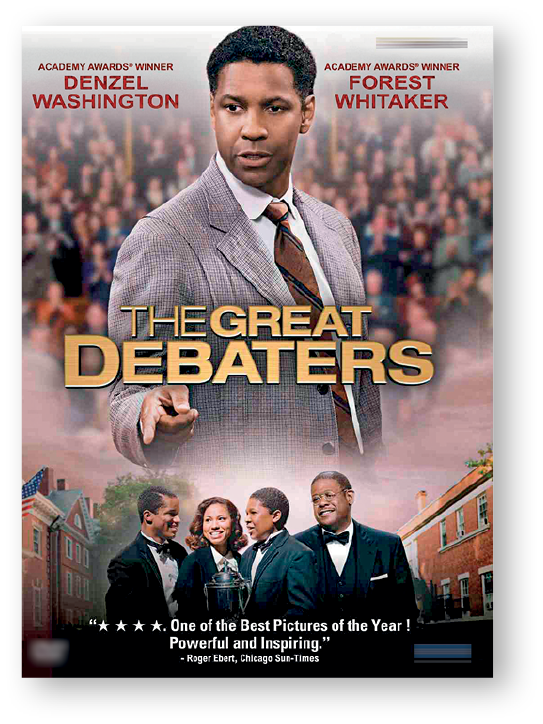
Director: Denzel Washington. Production companies: Harpo Films, Marshall Production and The Weinstein Company. United States, 2007.
This drama, directed and starred by Denzel Washington, is based on the true story of Melvin B. Tolson, a Texan professor who inspired his students to form the school’s first debate team in 1935. This team, formed by black students during racial segregation in the United States, relies on the power of word and arguing to challenge Harvard white students in a debate.

líst óvirégiuler vãrbs
|
Base form |
Past simple |
Past participle |
Translation |
|---|---|---|---|
|
be |
was, were |
been |
estar; ser |
|
beat |
beat |
beaten |
bater; derrotar, vencer; superar |
|
become |
became |
become |
tornar-se |
|
begin |
began |
begun |
começar |
|
bet |
bet |
bet |
apostar |
|
blow |
blew |
blown |
soprar |
|
break |
broke |
broken |
quebrar |
|
bring |
brought |
brought |
trazer |
|
build |
built |
built |
construir |
|
buy |
bought |
bought |
comprar |
|
catch |
caught |
caught |
capturar, pegar |
|
choose |
chose |
chosen |
escolher |
|
come |
came |
come |
vir |
|
cut |
cut |
cut |
cortar |
|
deal |
dealt |
dealt |
dividir, repartir; lidar; negociar, tratar |
|
do |
did |
done |
fazer |
|
draw |
drew |
drawn |
atrair, chamar a atenção; desenhar |
|
dream |
dreamed/dreamt |
dreamed/dreamt |
sonhar |
|
drink |
drank |
drunk |
beber |
|
drive |
drove |
driven |
dirigir |
|
eat |
ate |
eaten |
comer |
|
fall |
fell |
fallen |
cair |
|
feel |
felt |
felt |
sentir |
|
fight |
fought |
fought |
brigar; lutar |
|
find |
found |
found |
encontrar |
|
fit |
fit |
fit |
ajustar; caber, servir |
|
flee |
fled |
fled |
escapar, fugir; evitar |
|
forget |
forgot |
forgotten |
esquecer |
|
get |
got |
gotten |
adquirir; conseguir, obter; receber |
|
give |
gave |
given |
dar |
|
go |
went |
gone |
ir |
|
grow |
grew |
grown |
crescer; cultivar |
|
have |
had |
had |
ter |
|
hear |
heard |
heard |
ouvir |
|
hide |
hid |
hidden |
esconder, ocultar |
|
hold |
held |
held |
abraçar; segurar |
|
keep |
kept |
kept |
manter |
|
know |
knew |
known |
conhecer; saber |
|
lay |
laid |
laid |
colocar, pôr; deitar |
|
lead |
led |
led |
comandar, conduzir; levar |
|
learn |
learned/learnt |
learned/learnt |
aprender |
|
Base form |
Past simple |
Past participle |
Translation |
|---|---|---|---|
|
leave |
left |
left |
abandonar, deixar |
|
let |
let |
let |
deixar, permitir |
|
lose |
lost |
lost |
perder |
|
make |
made |
made |
fazer |
|
mean |
meant |
meant |
significar |
|
meet |
met |
met |
conhecer; encontrar |
|
misunderstand |
misunderstood |
misunderstood |
entender mal, interpretar mal |
|
overcome |
overcame |
overcome |
superar |
|
pay |
paid |
paid |
pagar |
|
put |
put |
put |
colocar |
|
read |
read |
read |
ler |
|
rise |
rose |
risen |
erguer, levantar |
|
run |
ran |
run |
correr |
|
say |
said |
said |
dizer |
|
see |
saw |
seen |
ver |
|
seek |
sought |
sought |
buscar; objetivar |
|
send |
sent |
sent |
enviar |
|
set |
set |
set |
ajustar, marcar, pôr em determinada condição |
|
shake |
shook |
shaken |
sacudir |
|
shine |
shone |
shone |
brilhar, reluzir |
|
show |
showed |
showed/shown |
apresentar, mostrar |
|
sing |
sang |
sung |
cantar |
|
sit |
sat |
sat |
sentar |
|
sleep |
slept |
slept |
dormir |
|
speak |
spoke |
spoken |
falar |
|
spend |
spent |
spent |
gastar (dinheiro); passar (tempo) |
|
spread |
spread |
spread |
espalhar |
|
stand |
stood |
stood |
estar em pé; suportar |
|
steal |
stole |
stolen |
roubar |
|
strive |
strove |
striven |
esforçar-se, lutar |
|
swim |
swam |
swum |
nadar |
|
take |
took |
taken |
pegar |
|
teach |
taught |
taught |
ensinar |
|
tell |
told |
told |
contar, relatar |
|
think |
thought |
thought |
achar, pensar |
|
throw |
threw |
thrown |
arremessar, jogar |
|
understand |
understood |
understood |
compreender, entender |
|
wear |
wore |
worn |
usar, vestir |
|
win |
won |
won |
ganhar |
|
write |
wrote |
written |
escrever |
* The meaning of the verbs may vary according to the context.

réfrences
AMERICAN LIBRARIES. Estados Unidos.
Principal revista da Associação Americana de Bibliotecas dos Estados Unidos, fundada em 1876 na Filadélfia com o objetivo de proporcionar debate, desenvolvimento e melhoria dos serviços bibliotecários e de informação no país.
ASANTE, M. K.; ABARRY, A. S. African Intellectual Heritage: A Book of Sources. Philadelphia: Temple University Press, 1996.
Coleção de textos de escritores antigos e anônimos, assim como de figuras públicas famosas nos tempos atuais, organizada por temas como criação e resistência à opressão, apresenta obras de ficção, política, história, religião e cultura de muitas sociedades ao longo do tempo.
BRITANNICA Student Encyclopedia. Chicago: Encyclopaedia Britannica, 2010.
Enciclopédia desenvolvida para crianças do início do ciclo escolar, apresenta artigos e curiosidades sobre uma vasta gama de assuntos.
COOK, C. (edição). Involuntary Resettlement in Africa: Selected Papers from a Conference on Environment and Settlement Issues in Africa. Washington, D.C.: The World Bank, 1994.
Livro que reúne periódicos sobre reassentamento involuntário selecionados de uma conferência sobre meio ambiente e moradia na Africa.
CRYSTAL, D. English as a Global Language. segunda edição. Cambridge: Cambridge University Press, 2003.
Livro que apresenta importantes reflexões sobre o inglês como língua de comunicação global.
EBERHARD, D. M., SIMONS, G. F.; FENNING, C. D. (edição). Ethnologue: Languages of the World. vigésima quinta edição Dallas: SIL International, 2022.
Obra de referência mais abrangente e anualmente atualizada com informações e estatísticas das línguas faladas ao redor do mundo. A catalogação, realizada desde os anos 1950, possibilita conhecer e analisar padrões de expansão e retração no número de falantes de cada língua em diferentes localidades.
INTERNATIONAL Labour Organization. Women at Work: Trends 2016. Geneva: ILO, 2016.
Relatório da Organização Internacional do Trabalho sobre posições, funções e salários de mulheres no mercado de trabalho.
INTERNATIONAL Policy Centre for Inclusive Growth. Youth and Employment among the BRICS. Brasília, Distrito Federal: International Policy Centre for Inclusive Growth, 2014.
Edição especial sobre programas sociais que promovem empregos aos jovens dos países que compõem o BRICS.
KAPLAN, R. B. Language Policy/Planning and Language Learning. In: HINKEL, E. (edição). Handbook of Research in Second Language Teaching and Learning. volume 3. New York/Abingdon: Routledge, 2017.
Obra do campo de estudo acerca das Políticas Linguísticas e Planejamento Linguístico.
Language. Washington, D.C.
Revista de publicação sobre temas ligados à linguagem.
MANDELA, N. Retirement Announcement. Johannesburg, 1º junho 2014.
Declaração de aposentadoria da vida pública do líder e ex-presidente da África do Sul, Nelson Mandela.
MINISTRY of Health and Quality of Life/Mauritius Institute of Health/World Health Organization. Dietary guidelines for the prevention of NCDs in Mauritius. Ministry of Health and Quality of Life/MIH/WHO, 2002.
Documento sobre doenças não transmissíveis que estão entre as principais causas de morte na República das Maurícias.
MONTGOMERY, S. L. Does Science Need a Global Language? Chicago: University of Chicago Press, 2013.
Obra que questiona a necessidade de a ciência ter uma linguagem global, especialmente sobre o fenômeno do uso do inglês em publicações científicas.
NATIONAL Assembly of Pakistan. The Constitution of the Islamic Republic of Pakistan. Islamabad: 2012 (versão atualizada da edição de 1973).
Documento da Assembleia Nacional do Paquistão sobre o debate da atualização de emendas feitas na Constituição da República Islâmica Paquistanesa, originalmente publicada em 12 de abril de 1973.
ô ê cê dê (2018), Reading performance Pisa (indicator). doi: 10.1787/79913c69-en.
Documento que oficializa a política linguística do governo indiano relativa ao uso progressivo do hindu, língua nacional, para que possa ser assegurado e incentivado.
Popular Science. Estados Unidos.
Revista cujo objetivo é informar o público em geral sobre notícias das áreas de ciência e tecnologia, traduzida e veiculada em mais de quarenta países.
UNITED Nations. United Nations Declaration on the Rights of Indigenous Peoples. New York: UN, 2007.
Documento aprovado pela ONU em 2007, no qual são reconhecidos direitos a fim de garantir a sobrevivência, a dignidade e o bem-estar dos povos indígenas do mundo.
WALKER, R. S.; HILL, K. R. Protecting isolated tribes. Science, volume 348, issue 6239, 5 junho 2015.
Artigo que discute como garantir o bem-estar dos últimos povos isolados sob crescente pressão e ameaças externas globais.
We 2.0. United States.
Revista trimestral publicada pela Washington Education Association, apresenta matérias sobre educadores, políticas públicas e questões relacionadas à educação local e ao estado de Washington, Estados Unidos.

Transcrição dos áudios
Encontra-se a seguir a transcrição dos áudios que são trabalhados ao longo do livro, com a indicação da respectiva atividade e página.
UNIT 1
Listening
página
Unit 1 - Health guidelines - Part um
Guideline six.
Provide students with health, mental health and social services to address healthy eating, physical activity and related chronic disease prevention. Schools are responsible for students’ physical health, mental health and safety during the school day. Because students’ academic success and well-being are intertwined with their physical and mental health and safety, schools have become key providers or links for services to address these needs. These services are especially useful for those students with chronic health conditions.
Unit 1 - Health guidelines - Part dois
School staff, especially school nurses, play a critical role in coordinating student health care services. School health, mental health and social services staff should ensure resources are available for health conditions related to diet, activity and weight. Health Services staff should assess students’ needs related to physical activity, nutrition and obesity, provide counseling and refer students to medical providers in the community. In addition to providing direct services for students, this staff should advocate to create a healthy safe and supportive school environment. A supportive environment allows students to make healthy dietary choices inside and outside of the school setting.
UNIT 2
Listening
página
Unit 2 - Institutional presentation - Part um
Student 1: This is the type of program that will make kids look forward to coming to school.
Student 2: Here at Montessori, they teach you that “hey, you have potential, you can do anything thatreticências”; if you just set your mind on it, if you keep working hard, they’re gonna give you the tools to have success in your life.
Narrator: A mixed group of seventh and eighth grade students is assigned to a team of two core content teachers for two years, spending large blocks of time daily in both classrooms. This model allows for formation of vital relationships, capitalization of individual strengths and uninterrupted learning time. Each trimester offers a thematic cycle of study from which content is approached. Cycle planners support student organization and keep parents up to date.
Unit 2 - Institutional presentation - Part dois
Student 1: I came in as one of the lower students and now I’m one of the top in the class. And so that just shows that those big blocks of time helped us to be able to learn.
Narrator: Montessori knew that extended periods of concentration were critical for inquiry, research projects, independent reading and writing, complex math processes, as well as essential small group lessons and teachers support. Students write and perform speeches, partake in literature studies and facilitate Socratic seminars, formal discourses centered around texts, questioning, inferring and exploring points of view. Students study life cycles through observation, animal care and the planting and maintaining of gardens.
UNIT 3
Listening
página
Unit 3 - Speech - Part um
Introducing speaker: Please welcome newly-appointed United Nations Messenger of Peace, Mr. Leonardo DiCaprio.
Leonardo DiCaprio: Thank you, Mr. Secretary General, your Excellencies, ladies and gentlemen and distinguished guests. I’m honored to be here today. I stand before you not as an expert, but as a concerned citizen – one of the 400,000 people who marched in the streets of New York on Sunday and the billions of others around the world who want to solve our climate crisis.
Unit 3 - Speech - Part dois
As an actor, I pretend for a living. I play fictitious characters, often solving fictitious problems. I believe that mankind has looked at climate change in that same way, as if it were fiction, as if pretending the climate change wasn’t real would somehow make it go away. But I think we all know better than that now. Every week we’re seeing new and undeniable climate events, evidence that accelerated climate change is here right now. Droughts are intensifying. Our oceans are acidifying with methane plumes rising up from the ocean floor. We are seeing extreme weather events, and the West Antarctic and Greenland ice sheets melting at unprecedented rates, decades ahead of scientific projections.
None of this is rhetoric and none of it is hysteria. It is fact. The scientific community knows it. Industry knows it. Governments know it. Even the United States military knows it. The Chief of the US Navy’s Pacific Command Admiral Samuel Locklear recently said that climate change is our single greatest security threat.
My friends, this body, perhaps more than any other gathering in human history, now faces this difficult but achievable task. You can make history or you will be vilified by it. To be clear this is not about just telling people to change their light bulbs or to buy a hybrid car. This disaster has grown beyond the choices that individuals make. This is now about our industries and our governments around the world taking decisive large-scale action.
Unit 3 - Speech - Part três
Now must be our moment for action. We need to put a price tag on carbon emissions and eliminate government subsidies for all oil, coal and gas companies. We need to end the free ride that industrial polluters have been given in the name of a free market economy. They do not deserve our tax dollars. They deserve our scrutiny; for the economy itself will die if our ecosystems collapse.
The good news is that renewable energy is not only achievable but good economic policy. This is not a partisan debate. It is a human one. Clean air and a livable climate are inalienable human rights. And solving this crisis is not a question of politics. It is a question of our own survival. This is the most urgent of times and the most urgent of messages. Honored delegates, leaders of the world, I pretend for a living but you do not. The people made their voices heard on Sunday around the world and the momentum will not stop. But now it is your turn. The time to answer humankind’s greatest challenge is now. We beg of you to face it with courage and honesty.
Thank you.
UNIT 4
página
Unit 4 - Talk - Part um
My talk is going to be divided into two parts. A little bit about why the challenge exists, what some of the factors are influencing, why it is so difficult to communicate the significance of what we do and then followed by what we can really do to change that, what we can do in our own careers and with our colleagues to make sure that we get our own message across when we really need to.
Unit 4 - Talk - Part dois
But just to step back for a minute, I know many of you probably aren’t familiar with my work. My background is in Marine Biology, I started in a graduate programme at the University of Maine and I was studying population dynamics of the very charismatic Maine sea cucumber and working with fisherman in a fishery which brings about a whole other suit of challenges. So, I was doing that work and it was a lot of reproductive fecundity work, a lot of measuring, a lot of modelling and at the same time I started working as a pop radio personality on a morning show, top fourty morning show. I didn’t tell my advisor I was worried about my stipend but it sounds like a bit of a tangent it’s really not because I quickly realised a lot of the things I was learning through basic social marketing strategy with the radio station should be applicable to the science community as well, because when we would bring a wonderful speaker we might fill the room with twenty people and at the university that was a smashing success, but with the radio station we could make something fun and engaging and tell that story in a such a way where thousands of people from the community would be interested and participate.
UNIT 5
Listening
página
Unit 5 - Vlog post - Part um
My name is Sayhirah Jailani and today I would like to enlighten you guys with the best topic which is we should not rely on technology too much. I do believe that [the] majority of us have or mobile phones or computers or even cars. But do you know that those things are part of technologies that people are depending too much nowadays according to Jon Capistrano? So, specifically, I would inform you guys in my opinion, we should not rely on technology too much because it will make us lazy, unhealthy and [lose] of real-world social skills.
Unit 5 - Vlog post - Part dois
OK. Moving to our first point, technology may be causing our society to become lazy in all aspects of life. Yeah, whether it’s taking a bus instead of walking or running or using a remote control to switch the channel instead of doing it manually and many more. And do you know that over 1,000 people are searching on Google on how to boil water, and how to boil eggs gets over 40,000 searches per month? Therefore, it shows that people nowadays rather choose to search on Google than ask people surrounding even if it is very simple and the easiest thing that we can do without making research.
Unit 5 - Vlog post - Part três
OK. In the second place, our health can be affected if we depend on technology too much. Yeah… According to UK Dissertation Experts, small kids avoid physical activities once they get any gadget in their hands. Therefore, playing electronic gadgets and eating a lot of fast food without doing any physical activity can add many pounds of weight. Yeah… Children, they don’t realize this in the beginning, but they suffer throughout their life. So, I think if we avoid ourselves from being addicted [to] technology, it can help us to stay healthy and live happily.
UNIT 6
Listening
página
Unit 6 - Video CV - Part um
Hi! My name is Melania Smyk and this is my video CV. I hope that by the end of this video you will have a feeling that you got to know me a bit better, and also that it will be clear to you what value I can add to your company. But let’s start from the beginning. I was born and raised in Poland. Despite this rather monocultural upbringing, I can safely say that I have a relatively international educational background. I graduated from I.B., which stands for International Baccalaureate, in a Polish high school and currently I’m studying international business and languages in Amsterdam, the Netherlands. I’m an organized and detail-oriented person. I have excellent writing skills in English, so I can safely say I write really good business reports, especially considering the fact that I really enjoy doing research.
Unit 6 - Video CV - Part dois
I’m also very persistent and motivated when trying to achieve a goal I care about. An example of this could be me moving to the Netherlands. Well, it was not easy, there were some obstacles on the way, such as financial problems and lack of support from people that were supposed to support me, but, in the end, I decided to not let go of my dream, so I got a job, I worked hard during the summer, I saved some money and I made it happen. Then the people who did not believe in me got convinced, because I did not take no for an answer and I did it. I achieved my goal and moved to the Netherlands and where I’m studying right now. Although I may come off as a serious person, that’s only because I’m serious about what I do, whether it’s a school assignment or work, but I’m still fun to work with. My colleagues told me that they feel they can depend on me at work and that I’m very professional, but also that I know when I can relax and just be more fun. I’m also very analytical and I appreciate the positive, transparent atmosphere in a team. I try to understand others’ perspective and to communicate clearly and to basically be honest, because I think that’s the basis for good and efficient work. Thank you for watching.
UNIT 7
Listening
página
Unit 7 - Testimony - Part um
[speaks Indigenous language introduction] I’m Aboriginal. Both my parents are Aboriginal. And my Mum comes from the northern suburbs of Sydney and she’s from the Guringai people, the Guringai language group and the Gai-marigal clans. And I used to spend some time with my grandmother, my mother’s Mum and we used to go shopping. She lived in Harbord, which is a northern beach, and we’d go all the way to Manly, which is a southern beach on the North Shore. And we would catch the transport which was the old double-decker buses.
Unit 7 - Testimony - Part dois
And Grandma would be there on the way back and she’d have the string bags all full of groceries and she always slid me my money. Being fair skinned I didn’t realise the levels of racism in those days. This is back in the ’50s and early ’60s. But Grandma would slip me my tuppence or my penny, halfpenny, or whatever the bus fare was, and like a child I would just race upstairs and race to the front of the bus and then sit down. And it was like surfing the bus as you sat upstairs and it was so exciting. But as a child you never thought about: ‘Where is your grandmother?’ And there is this beautiful black lady downstairs sitting on the back seat where the conductor usually sat or on the first row of seats just inside the door where all the fumes of the bus were.
Unit 7 - Testimony - Part três
And Grandma was quite cunning because her and Nanna Watson, another Aboriginal lady that we were very close to, when they’d go shopping together, they used to know a little bit of Maltese, and if there was a new conductor they would speak Maltese to try and act as if they were immigrants, and they could then sit at the front of the bus. But if the conductor knew that they were Koori, knew that they were Aboriginal, unfortunately they sat in the exposed part where they got the fumes. And it just gives you the idea of the racism that existed within the public transport system.
UNIT 8
Listening
página
Unit 8 - Oral debate - Part um
Sarah Jacob: Hello and welcome! In 1947, the English left India, but their language continues to define and divide us as a nation. English is the language of business, of higher education, of government policy, of the high judiciary, the military and of national politics. And there are also distinct social disadvantages of not having a strong command over English. An English speaker in India earns thirty-four percent more than any Hindi or other language speaker. And at the same time, only twenty percent of India’s population can speak in English and only four percent would be considered fluent. And so today we are going back to the age-old debate of the importance of Hindi versus English which is again becoming a politically charged issue with the government showing its allegiance to Hindi more than other Indian languages. So, should India’s focus be on English and not Hindi, or vice versa?
Unit 8 - Oral debate - Part dois
Sarah Jacob: So, what do you think of this government’s push of Hindi first? You are a Hindi writer.
Ashok Vajpeyi: Right, the government push will be in not in the best interest of Hindi, it will also not be in the best interest of Indian languages. Hindi must develop along with other Indian languages, as Chetan was saying. They all should feel comfortable with each other. It is the job of a welfare, democratic state to provide promotion to all the languages. Now official language, incidentally is a very small part of language. Language is used by the whole broad society. Officialsreticências I mean they are an abysmally low percentage which come to government. And, incidentally, in government the notion that it can only be done in English is a false notion. I have been in civil service for thirty-five years. You don’t have great intellectual analysis to do there, or to propose philosophical principles, which require intellectual density. It is workaday, you know, life which is dealt there. Therefore, if you look at the binary, I think that’s the wrong binary. English has its place, it’s an important language, as you say. It’s a global language. It is the language of power, whether you like it or not.
Sarah Jacob: That’s the reality.
Ashok Vajpeyi: But, apart from power you’ll need other things. You need resonances of your race. You need racial memory, you want to evoke your past. All that is done in Indian languages. And it is being done. It is not as ifreticências see if you go to other places. I mean, it is only in metros that you seem to be obsessed with English. But If you go to Patnam or Jaipurreticências
Unit 8 - Oral debate - Part três
Sarah Jacob: Is that true? Chetan, you agree? Is it only in metros that we are obsessed with English?
Chetan Bhagat: It depends on what you mean by obsessed. I mean if he’s trying to say thatreticências people like if you go to a small town, they do use Hindi a lot more. The leading newspaper will be Hindi.
Sarah Jacob: But don’t your books sell most in smaller towns?
Chetan Bhagat: But, the aspirational level is very high, even there.
Ashok Vajpeyi: Yeah, yeah. That’s true, that’s true.
Chetan Bhagat: I think that, how you define it… What he’s saying is, it’s not used as much.
Arjun Kapoor: It’s not a marker to judge a person’s sense of, I guessreticências
Chetan Bhagat: Even if you go to Indore or Bhopal, the leading newspapers are Hindi there. English newspapers have made now dent, or very little. But there is a huge aspiration.
Sarah Jacob: But parents will do whatever they can to put their kids in English medium schools, whether it’s a small town or a big city.
Arjun Kapoor: Yeah, yeah, that is a reality.
Sarah Jacob: [unintelligible excerpt]
Chetan Bhagat: One of the reasons for my success is this: that the smaller towns took to an English author like never before and because the books are in simple English, and they actually find this author, sometimes he talks in Hindi also [phrase spoken in Hindi]. So that is there. But I guess what he’s trying to say is that in the metros, it’s a world. It’s a world you enter. It’s not just a power, it’s a world you get if you speak English. If you don’t speak that world you don’t get that.
THERE IS MORE
página
There is more - Unit 4 - Interview about science
Jorge Salazar: On the podcast is Alan Alda, an Emmy Award Winning actor who champions communicating science to the public. Alda founded at Stonybrook University’s Alan Alda’s Center for Communicating Science, which trains scientists and help professionals on how to communicate more effectively with the public, public officials, the media, and even other scientists outside their own discipline. Here’s Alan Alda. We’re thrilled to have you speak in Austin at the SuperComputing 2015 Conference. How does it feel to do this?
Alan Alda: It’s very exciting. As you probably know, I’m very interested in communicating science clearly and accurately, uhm, not interested in dumbing it down, but the problem is powerful computing affects all our lives and can eventually save our lives, it, it can eventually help us survive some of our own unfortunate efforts that have affected climate, for instance. To model climate change is one of the great benefits we’re gonna get from supercomputing. The trouble is, to really help the public understand all the benefits that they can get from supercomputing, it has to be communicated with clarity so that they get it.
página
There is more - Unit 5 - Podcast commentary on the Internet
One of the biggest things that we’ve seen over the years is that where internet and regulators get really, really messed up tends to be around questions of jurisdiction, and what regulations apply and where. The internet has no borders. Data flows most freely around the globe at the click of a mouse, or a swipe of your finger on a mobile device. But that couldn’t last entirely, uhm, like that in an open set up. Governments, and corporations, and individuals, with varying degrees of success, have tried to reach out into the internet and draw more traditional geographic boundaries throughout it. That’s why we see ridiculous things like geo blocked content, where you go to view a video, or buy an e-book, and are suddenly told: “we’re sorry, but this content is not available in your country”, or something like that. To almost everyone, upon encountering such a message, this seems really ridiculous. It’s an artifact of old real world, legacy, is trying to deal with the modern internet that has no borders.
página
There is more - Unit 8 - Oral debate - Part um
Barkha Dutt: Should language still be such a flash point in modern India? Does a country of a billion people that doesn’t seem to be united by anything other than it is empirical and easily defined, need a link language? On the one hand, Indians have begun to boast of how the vast numbers of English-speaking Indians have provided an advantage to India on the global stage. On the other hand, is an entire new generation of Indians in danger of losing touch with their mother tongues, whatever they may be. Controversially, governments had earlyreticências earlier proposed the three-language formula for schools across India, namely Hindi, English and somebody’s respective mother tongue. Is that the best way forward and, more to the point, should language define the model Indian identity in such a primal way as it continues to? I want to start with Mark Tully, who has spent so many years and decades now in India and probably speaks better Hindi than most people I know.
There is more - Unit 8 - Oral debate - Part dois
Mark Tully: Oh no, I wish I did. [unintelligible excerpt] I don’t speak better English than most Indians speak.
Barkha Dutt: And that is the paradox of India, that you know the classic questions that many Indians travelling abroad would be asked, at one point, “how did you get to speak such good English?”, and Indians would always, Indians of a certain class, would always find the question extraordinary. But you have often lamented in your writings, in your comments, the fact that so many Indians seem to embrace English as their language, not just of mobility but, as I like to say the language they dream in.
Mark Tully: Well, I do think it’s a pity. I think that English, you know, has been called by someone a killer language. And it is a language which does, when it takes over, it does have a very adverse effect on other languages. I also think, particularly with Hindi, funnily enough, that there are far too many Indians who don’t really respect Hindi. And it’s an extraordinary thing but I reallyreticências
There is more - Unit 8 - Oral debate - Part três
Barkha Dutt: Why? We love our Hindi cinema… we have our own modern variation of Hindi, we may not speak [unintelligible excerpt]
Mark Tully: [unintelligible excerpt] You take my example, I would speak to someone in Hindi and they will automatically reply to me in English and then I will explain to them I’m trying to learn Hindi. How the hell could I learn it if you don’t speak it?
Barkha Dutt: “If you keep talking to me in English”.
Mark Tully: You speak on like this. So, I think there is a lack of respect for Hindi, particularly. I think another thing which is very important to remember in this country is you need a link language, but don’t forget how the position of Hindi has improved enormously ever since you stopped trying to force it down people’s throats. And I would still say that Hindi is a far, far larger link language in this country than English is.
Barkha Dutt: So you believe Hindi can indeed be that link language?
Mark Tully: Well, I think it can do, myself.
página
There is more - Unit 8 - Interview
Interviewer: Do you speak a language that is hard to find online? Are you from a place where your mother tongue is not widely spoken? Then you may be part of a large group of people around the world who speak and write under-represented languages. Eddie Avila is the director of Rising Voices with Global Voices online and he told me how he came to explore this subject.
Eddie Avila: It all started with my work here in Bolivia. I’ve been working with a group of young people from El Alto, they are Indigenous members of the Aymara community, and they’ve taken part at some “var” blogging workshops, and they started to blog in Aymara, and started with this process of attracting other young people to start using these tools to, you know, write in Aymara and more importantly connect with others around the world who are seeing their native language now available online; and so it’s much more active. This group has been using Facebook and Twitter, they have their own blog, they started working with the Wikipedia version in Aymara. It’s just a way to contribute to the content available online; and so most of these young people are bilingual and some cases trilingual, but they are able to build a bridge between, you know, Spanish and Aymara.